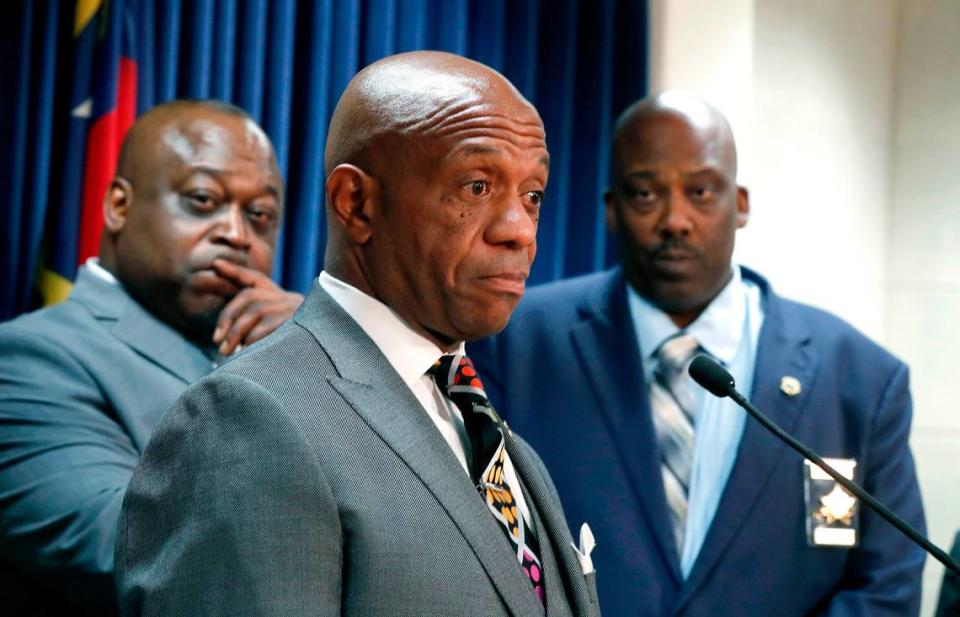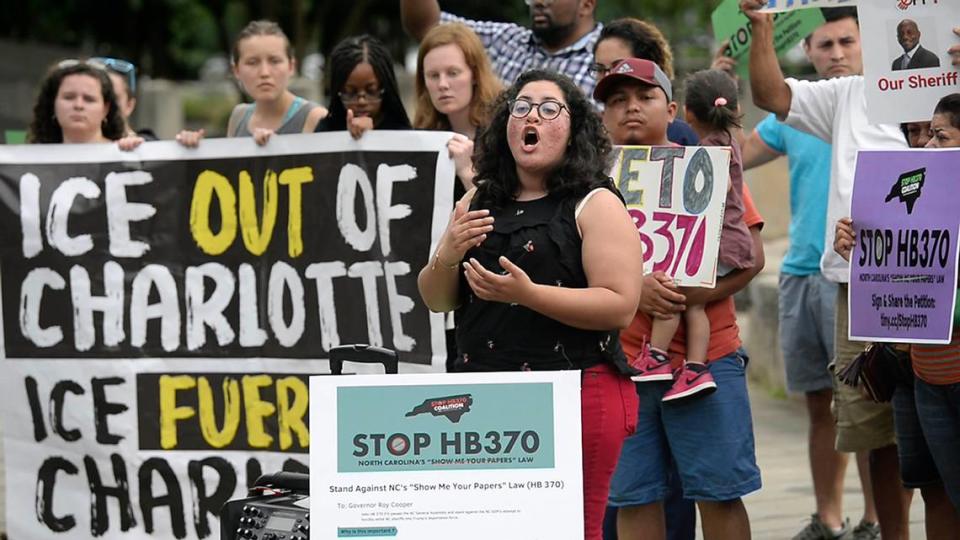After years of battles, NC GOP is on the cusp of requiring sheriffs to cooperate with ICE
- Oops!Something went wrong.Please try again later.
- Oops!Something went wrong.Please try again later.
- Oops!Something went wrong.Please try again later.
After six years of trying to force local law enforcement in some of the state’s most populous counties to cooperate with immigration authorities, North Carolina Republicans are on the cusp of passing legislation to do so.
A political battle between GOP state lawmakers and sheriffs in largely Democratic counties — many of whom came into office in 2018 responding to the backlash on the left to the Trump administration’s immigration policies by vowing to limit or end cooperation with U.S. Immigration and Customs Enforcement (ICE) — could come to a conclusion during this year’s upcoming legislative session.
Legislation that passed the House last year is expected to be taken up by the Senate when lawmakers return to Raleigh at the end of April. If it becomes law, House Bill 10 will require all 100 sheriffs in the state to notify ICE if they can’t determine the legal status of a person charged with certain high-level offenses. The bill would also require sheriffs to honor requests by ICE to hold people it believes are in the country illegally for up to 48 hours to give federal agents time to take them into custody.

HB 10 was filed quickly after lawmakers convened for last year’s long session, and it passed the House in late March with the support of three Democrats. It languished in the Senate for the rest of the year, but Republicans are ready now to pass the bill and send it to Democratic Gov. Roy Cooper’s desk, says the bill’s primary sponsor, House Rules Chairman Destin Hall.
Lauren Horsch, a spokeswoman for Senate leader Phil Berger, also told The News & Observer that Berger supports taking up the bill.
Cooper has twice vetoed similar bills passed by the GOP-dominated legislature. This time, as Republicans prepare to act on an issue that, according to many polls, is the top issue of concern for voters, they have a supermajority in both chambers that overrode Cooper’s veto 19 times last year after going five years without being able to overcome the governor’s veto pen.
Hall says the bill only became necessary after the election in 2018 of sheriffs that campaigned on ending cooperation with ICE.
“Even today, by our count, there’s maybe six or seven sheriffs out of the 100 sheriffs in North Carolina, who don’t voluntarily cooperate with ICE, which means that 90-some sheriffs in our state, they don’t really need this law,” Hall said in an interview last month. “But because of the handful of sheriffs who are not cooperating, we have to pass this bill.”

Opponents of the bill say it will only make the job of keeping communities safe more difficult for local law enforcement. Questions have also been raised about the constitutionality of the requests from ICE that the bill would require sheriffs to honor, known as immigration detainers, and whether the bill encroaches on the authority of local elected officials to set and abide by the policies voters want them to follow.
“The problem with that is, someone who gets picked up in Mecklenburg County, they’re not necessarily going to stay in Mecklenburg County,” Hall said, responding to the question of local authority. “These are folks who obviously don’t respect national borders, they’re not going to stay in one given county.”
In Charlotte, a sheriff stops honoring ICE requests
Mecklenburg Sheriff Garry McFadden, who stopped honoring ICE detainers and ended a cooperation agreement with the agency under the federal program known as 287(g) the day after he was sworn into office in December 2018, has been a relentless and vocal opponent of the legislature’s efforts to force him and other sheriffs to work with the federal agency.
McFadden says his office continued receiving detainer requests from ICE after he was elected, but no longer does. In an interview, he said his deputies will hold someone ICE asks them to detain so the agency can take custody, as long as ICE officials present a signed document from a judge or magistrate, like a warrant or criminal complaint — which a detainer is not.
Under existing state law, sheriffs are required to try to determine the legal status of people they arrest if they’re charged with a felony or for impaired driving. They’re also required to notify ICE if they can’t determine legal status. They’re not, however, required to honor ICE detainers asking them to hold someone for up to 48 hours, so that federal agents can take custody.
That’s been the crux of the political fight between ICE-skeptic sheriffs and the legislature since 2018, and what lawmakers are trying to require with HB 10.
McFadden has argued since he was first elected that it’s unconstitutional to continue holding people at the behest of ICE after they have posted bond and are eligible for release ahead of a court appearance.

He also argues that if the goal is to keep out of the country people who have committed serious crimes and are here illegally, then the current mechanisms in place that lawmakers want him to comply with aren’t effective.
Individuals who are repeat offenders, he mentioned as an example, won’t be deterred from trying to reenter the country if they’re deported. And if they’re deported without first being convicted of the crime they were charged with, the victim loses out on the chance to see the offender be held accountable, and the offender doesn’t get their day in court, McFadden said.
“If you drop the charges for the detainer, and you drop them off south of the border, they come right back,” McFadden said. “And then what happens? Then, the victim lives in fear.”
Instead of immediate deportation, McFadden said it’s important to note there is existing federal law under which ICE has the ability to charge people for illegally entering or reentering the country. Doing so would be more effective, he argued.
One of those laws, Section 1325 of Title 8 of the U.S. Code, came under scrutiny during the 2020 presidential election, when some Democratic candidates said they supported its repeal after the law became the basis for the Trump administration’s “zero tolerance” policy on illegal immigration, The Washington Post reported.
McFadden was one of 11 sheriffs that wrote in opposition to HB 10 when it was being considered by the House last March, telling lawmakers in a letter that the bill would impose “substantial administrative burdens” to jail staff and the court system, and would make communities less safe by making people who are in the country without legal authorization less likely to trust authorities.
The sheriffs also raised concerns about the constitutionality of detainers under the Fourth Amendment, and said they were worried that even though the bill included a provision limiting state and civil liability, it didn’t address the liability sheriffs could face under claims of constitutional rights being violated.

Released, then arrested again
Pushing back against the notion that detainers aren’t effective, Hall said that ICE routinely works with local prosecutors and district attorney’s offices to determine if someone should be held in custody and brought back to court to face trial, or if they should be deported right away.
“It’s not a situation where ICE is coming in, and just somehow taking this person away, and the state of North Carolina never hears from them again, as it relates to their criminal charges,” Hall said. “So, they’re cooperating, just like the sheriffs should cooperate with ICE, the local (district attorneys) cooperate with ICE the same way. And that’s the way it is across all law enforcement.”
Hall said it is “absolutely absurd” for opponents of the bill to claim that fighting it will help victims of serious crimes committed by people who have entered the country illegally. He pointed to the case of Luis Pineda-Ancheta, a Honduran man who was arrested twice by police in Charlotte in May 2019 on domestic violence charges, including once after a nine-hour standoff involving a SWAT unit, and released by the Mecklenburg sheriff’s office both times, despite ICE issuing detainers each time.
The case became a major flash point in the debate over local cooperation with ICE.
McFadden was criticized by ICE, the U.S. attorney for the region and his predecessor, on the grounds that his lack of cooperation was making the county less safe. He responded by saying that his office was obligated by law to release Pineda-Ancheta once he had posted bond and satisfied the court-ordered terms of his release, and questioned why ICE didn’t seek an arrest warrant for illegal reentry.
Still, ICE said that even if he wasn’t going to honor the detainer, McFadden should’ve notified the agency when Pineda-Ancheta was going to be released.
An ICE fugitive operations team arrested Pineda-Ancheta less than 24 hours after he was released. In 2021, he was sentenced to 20 years in federal prison after a jury found him guilty of kidnapping his ex-girlfriend.
During the 2018 fiscal year, ICE’s Enforcement and Removal Operations division issued more than 177,000 detainers, according to the agency’s latest annual report. That figure plummeted to just under 66,000 during the 2021 fiscal year, in the immediate aftermath of the COVID-19 pandemic, before rising to more than 125,000 detainers in 2023, matching levels reached in 2020.
In a statement, ICE spokesman Lindsay Williams said that detainers are a “critical public safety tool” because they focus resources on “removable noncitizens who have been arrested for criminal activity.” They also increase safety for everyone involved — ICE agents, law enforcement officials, the person being taken into custody and the public — he said, “by allowing an arrest to be made in a secure and controlled custodial setting as opposed to at-large within the community.”
By allowing ICE to take custody directly from state or local authorities, detainers also “minimize the potential that an individual will reoffend,” and conserve scarce government resources, Williams said.
Responding to McFadden’s assertion about existing federal laws that ICE could use more often, Williams said that while the agency seeks criminal charges in some cases, “proceeding with criminal charges against a noncitizen for illegal entry or illegal reentry is not feasible in equal measure with the number of situations where a detainer may be issued.”
“A comparatively small percentage of the cases meriting a detainer will generally meet the criteria for prosecution,” Williams said. “Even if the case meets the criteria for prosecution, whether the case is accepted for prosecution by the Department of Justice is a separate consideration.”
National politics hang over immigration debate
The surge in illegal crossings at the southern border, and the strain the influx of migrants has had on cities across the country that are struggling to house them, have propelled the issues of immigration and border security to the top of voters’ minds.
A Gallup poll released in February found that, for the first time since 2019, immigration topped the list of important problems facing the country, beating out the government, the economy and inflation.
In a North Carolina poll released by WRAL last month, voters ranked immigration only sixth in importance. But in that same poll, North Carolinians of all political affiliations supported greater border security, with 71% of surveyed Democrats and 77% of unaffiliated voters agreeing with 87% of Republicans that immigration across the southern border should either be stopped entirely or should be reduced from Central and South America.
Hall said voters are concerned because it’s a matter of “common sense” that resonates with average people, regardless of their politics.
“No matter where they stand on the spectrum of immigration issues, they still want us to have a border, and they still think that if you’re here illegally, and you’re committing crimes, you ought to be deported,” Hall said.
Former President Donald Trump has campaigned on restoring his administration’s immigration policies if he returns to office. During a rally in Greensboro last month, Trump vowed to supporters that if he wins a second term, he would launch “the largest domestic deportation operation in American history.”
Days before that rally, both Trump and President Joe Biden visited different parts of the U.S.-Mexico border in Texas. During his trip to the border, Biden urged Trump to reconsider his stance on a bipartisan border security deal negotiated in Congress that the former president came out against, effectively killing its prospects — something that Biden has slammed him for.

Biden has opted for tougher rhetoric on border security in recent months, signaling a shift that has alarmed some activists, but could resonate with concerned voters, The Associated Press reported earlier this year. In January, as he was pushing Congress to put the now-scuttled border security bill on his desk, Biden said the bill would give him emergency authority to “shut down the border until it could get back under control,” and said that if the bill were law, “I’d shut down the border right now and fix it quickly.”
The Biden administration also called on local officials to cooperate with ICE when it comes to dangerous individuals who are in the country illegally.
“We welcome local law enforcement’s support and cooperation in apprehending and removing individuals who pose a risk to national security or public safety,” a White House spokesperson told Fox News in late February, in response to what the outlet said was a question about cities with sanctuary policies. “When a local jurisdiction has information about an individual who could pose a threat to public safety, we want them to share that information with ICE.”
McFadden said that in his six years in office, there hasn’t been a month when he hasn’t had a discussion about immigration with someone involved in the process, including at times, regional directors from ICE, or officials from the U.S. Department of Homeland Security.
Those conversations, McFadden said, have shown him that everyone knows the current system is broken, and no one has a solution.
“We have to find a better fix than what we’re doing now,” McFadden said. “Simply pointing at each other, saying, ‘it’s your fault, it’s your fault.’ When Biden is in office, it’s Biden’s fault. When Trump’s in office, it’s Trump’s fault. Trump said he’s going to build a wall, the wall is not built. Now they say, ‘Biden, you should build a wall,’ and now Trump’s saying, ‘Well, I’ll come back and finish the wall.’ So, these are just catchphrases.”
Hall said that for voters whose top issue is immigration this year, there’s no comparison to be made between Trump’s record and Biden’s record, and that it’s “obvious” that Trump will do a better job if he returns to the White House.

Opponents say bill will break trust with immigrant communities
Activists and lawmakers who have been fighting HB 10 and previous versions of the bill have argued that it’ll make undocumented people fearful of talking to law enforcement, laying waste to the efforts by sheriffs like McFadden and others to build trust with immigrant communities since taking office.
Stefania Arteaga, the co-founder and co-executive director of the Carolina Migrant Network, pushed for an end to Mecklenburg’s participation in the 287(g) program, and was at the ceremony McFadden held the day after he was sworn in to announce the new policy.
At the time, activists hailed the elections of sheriffs like McFadden as a promising sign of the ability of local officials to resist and push back against the immigration policies coming from the federal government.
But after six years of battling the legislature on bills like HB 10, Arteaga said it’s “extremely concerning” that the will of voters who elected McFadden to specifically cut back cooperation with ICE could soon be ignored.

Arteaga said her organization has had conversations with other groups about the potential of challenging the bill in court if it becomes law, but she said it’s important to first see what the final bill ends up looking like after it’s taken up by the Senate, and if any changes are made.
In the meantime, groups like Arteaga’s are focused on ensuring immigrants — especially those who have recently arrived in the country — are aware of their rights when interacting with law enforcement.
Ricky Hurtado — a Democrat from Alamance County who was the only Hispanic legislator in the state when he defeated GOP Rep. Steve Ross in 2020, and subsequently lost to Ross in 2022 — said he’s most concerned about the impact the bill could have on the willingness of victims of crime to talk with law enforcement, especially in cases involving domestic violence.
“There’s a reason why there’s so much concern from grassroots groups, from community leaders — because they recognize that there’s always collateral damage on innocent people when it comes to things like this,” Hurtado said.
Arteaga and other activists also argue that workers without legal status, especially farm laborers, could decide that it’s better to leave the state altogether, if they face an increased threat of coming into contact with ICE and being deported. Arteaga says fears of an exodus of laborers in states like Georgia and Florida, in the aftermath of similar laws being enacted that cracked down on illegal immigration, justify concerns about what the economic impact of HB 10 could be on North Carolina.
Farmers struggling to find workers to harvest labor-intensive crops led then-Georgia Gov. Nathan Deal to try to address the issue by putting probationers to work in vegetable fields, The Associated Press reported in 2011. But business leaders urged lawmakers to find a permanent solution, estimating at the time that Georgia farms were losing hundreds of millions of dollars.
“I think this bill is certainly coming from an angle of using immigrants as scapegoats and for political games, certainly for some of these representatives, and not really thinking through the economic, certainly the human carnage, and also the extent that this will cost taxpayers,” Arteaga said.
In the Spotlight designates ongoing topics of high interest that are driven by The News & Observer’s focus on accountability reporting.

